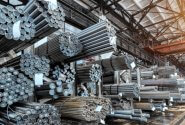Small industries have a significant share of the country’s industry and at the same time have created many job opportunities in the country, especially in deprived and less developed areas.
Accordingly, supporting these industries means maintaining sustainable industrial employment. These small industries require low initial capital; Therefore, they are more important. In fact, the capacity of the private sector can be used to develop the activities of small units. At the same time, they can play an effective role in economic prosperity, boom in production and sustainable employment. Therefore, paying attention to small industries and supporting them, especially in the current sensitive situation of the country, should be seriously considered. These industries have not yet had their true place in the mining industry, because most activities in this field are capital-intensive and do not make sense on a small scale, but most of these large industries in the supply chain use small units, so the possibility of development There are also small industries in the mining sector and related industries.
Now, to examine the role of small industries in the mining sector and related industries, a conversation has been held with Keyvan Jafari Tehrani, a senior expert in the international market. You can read the full text of this conversation below.
*** Do the mining industries have the capacity to develop small industries?
How effective do you think small industries are in the development of the mining and mineral industries? Do the mining industries have the capacity to develop small industries?
Iran has special capacities in the field of mines and these capacities have provided the ground for the growth of the mining industry. There are large and reputable mines with significant reserves of copper, iron ore, lead and zinc in our country. The extraction and exploitation of these reserves, which also have a significant number, is the responsibility of the government or government-affiliated companies (properties). The structure of the country’s mines is such that most metal reserves are scattered and the number of small mines is at least 50 times that of large mines. These units are often privately owned. These units will survive if they can sell their product and have a buyer, but they are extremely weak and vulnerable to market conditions. Exports should be considered as one of the main factors in preserving the life and activity of these small groups.
*** Small metal mines
Fortunately, the country’s small metal mines have been able to export part of their production over the past years and continue their activities. However, in any situation where the export situation of the mining industry has faced problems for various reasons, such as lower prices at the international level or export restrictions for Iran, these mines have lost the ability to continue their activities. There are several solutions for the continuation of the activities of these units. Integrating the processing activities of mined products should be considered as one of the best solutions that strengthens these complexes against damage. This means that the owners of these mines can build a joint processing unit near several small mines with the aim of increasing executive capacity and reducing investment.
In this way, the feed of this unit will be supplied from the surrounding mines and the field of value creation and profitability will be provided for the owners of these industries as much as possible.
*** What effect do these small units have on economic prosperity, job creation and productivity spurts?
Mineral reserves are often located in remote and deprived areas. These reserves are also fragmented; Therefore, the start of extraction activities and production of products in the next circles has a significant impact on the economic growth of those areas. At the same time, with the start of new businesses, the ground for a production leap will be realized. In the following, several job opportunities are created. Many of the natives of that area are getting out of false job opportunities.
That is, by launching each small mining unit in an area directly and indirectly, several job opportunities are created. Now, the larger the scale of the units, the more exponentially the job opportunities created will increase. As an example, part of the indirect employment of these units is created in the field of transportation. The higher the turnover, the more job opportunities will be created.
*** Impact of the presence of mines in deprived areas
The presence of mines and the construction of related industries in deprived areas causes the infrastructure of these areas to be completed in various areas such as water, electricity, access roads, etc. All these facilities provide the ground for economic prosperity in these areas. As we have seen in many cases, in addition to the activities of the mining sector and related industries, various welfare facilities have been created for the people. These services even have a positive impact on other businesses in the region.
Of course, it is natural that the larger the units, the greater the social welfare created in that area. As far as we can see, most large companies, in order to fulfill their social responsibilities, create a wide range of facilities for the local people. Among these facilities, we can mention the construction of medical and welfare centers to cultural, sports, social and … activities.
Of course, there are challenges in these cases. For example, sometimes this job creation is created grammatically. In such cases, sometimes non-specialists are imposed on a group and do not have sufficient work efficiency. But this job creation, whether selective or mandatory, will have positive results for the region.
*** What challenges do small units operating in the mining sector and related industries often face?
These units despite The positive effects they have on the built-up areas, the many job opportunities they create, and the well-being they bring to the people are sometimes opposed by the indigenous people. These opponents sometimes challenge the activities of these industries, because they believe that starting a business related to the mining industry conflicts with the continuation of their traditional activities. In such a situation, industries and businesses are forced to provide all kinds of services to the indigenous people in order to gain the support of the protesters, so that they can finally enjoy their support. Employment creation for non-specialists, mentioned earlier, is one of the issues that provide the basis for interaction between industrialists and indigenous peoples.
In some cases, the laws and directives approved by the Ministry of Industry, Mines and Trade and those in charge of affairs also challenge the owners of these small industries.
*** How important is the construction of small industries in the current situation where the country is facing the problem of financing?
Starting large units requires considerable liquidity. Accordingly, in the current situation in which the financing of capital in the country has been challenged, it is possible to continue activities in various fields in the form of small industries by constructing small industries. At the same time, it should be emphasized that the integration of small units in the field of mining industry will help them to continue their activities, especially in areas that require higher investment. For example, a processing unit does not need to be built for a single mining unit. If this processing unit is established near or inside one of the small mines, the required feed can be supplied from other nearby mines by planning.
The cost of investing between units is broken down and greatly reduced. Licensing processes are reduced. The supply of infrastructure such as water, electricity, etc. is limited to one unit and will be a cost savings.
At the same time, there is no need for structural integration to be implemented between small units, and only an agreement is reached to implement one step of the path together; The parties decide to take a step forward together and together, instead of starting a new investment in the processing path. Finally, reach an acceptable agreement.
*** How can the government support these industries?
Government support for small industries is achieved through facilitation of laws and regulations. Especially in the current situation, the government is facing the most difficult economic problems and the country’s financial resources have been drastically reduced. Obviously, in such circumstances, no financial assistance can be expected from the government.
Banks, as institutions for financing, are not able to support the activities of industries and businesses. Accordingly, banks do not accept mining licenses as collateral. This is despite the fact that the central bank has repeatedly requested or notified banks to use the mining license as a guarantee document, but the banks have refused to implement this notification. Because they are more accessible to get bail.
Therefore, given the current situation, the government should hand over the management of mines to the private sector. Facilitate government rights. Then provide services and concessions to collections that increase their production.
Naturally, in these circumstances, the best measure is to facilitate the provision of mines to private sector units, to facilitate the terms of government law, so that companies that operate and those that really plan to increase production, and especially higher value-added production, cooperate. To be interested in more activity.
In fact, the rules should be regulated in such a way that capital owners are interested in working in the mining industry. In the future, the conditions for the development of production should be provided and even the units should move in this direction.
*** Is there experience in small mining industries in other countries? How do other governments support these industries?
Australia and Brazil are rich in minerals. The mineral reserves of these countries are exploited by domestic and foreign investors. For example, the Spanish company Rio Tinto is the original company and the British company BUCHP is the original company, both operating in Australia, or the Anglo-American company, which is the original English company operating in Brazil.
India is also one of the countries with significant mineral reserves that has worked for the growth of its mining industry over the years. Mines in India are also part of Anfal and are often operated by large state-owned companies.
But the country’s countless small mines are privately owned.
In 2015, the country planned a new vision for the development of the steel industry. According to the document, the country’s steel production in 2030 should increase to 300 million tons. Accordingly, the country needs about 600 to 700 million tons of iron ore on the horizon. While the country’s current iron ore production capacity is estimated at 250 million tons; This means that this production should be more than doubled.
It is worth mentioning that the Government of India has made a detailed plan and compiled a comprehensive plan to achieve this goal. In this roadmap, the production of one third of the mentioned iron ore is entrusted to small mines. Therefore, small units can play an effective role in the economic development of the country. Accordingly, the Government of India in 2017, has taken a number of measures to support the country’s small industries. These measures provide the ground for the presence of the private sector and the realization of the mentioned goals.
این مطلب بدون برچسب می باشد.












ثبت دیدگاه